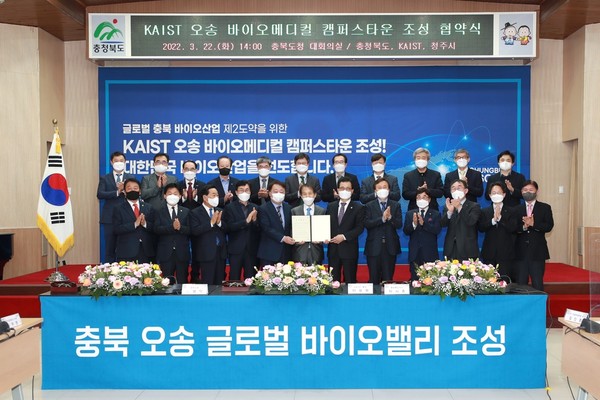On March 22, KAIST President Kwang Hyung Lee signed an agreement with North Chungcheong Province Governor Si-jong Lee and Cheongju Mayor Beom-duk Han to create a new campus in Osong, Cheongju, dedicated to biomedical sciences. To ensure that the agreement is implemented swiftly, the involved parties will make efforts for the new campus to be included in the national agenda, in accordance with President-elect Yoon Suk-yeol’s pledge to improve the “Osong Bio Valley” in the Chungcheong Province. This new undertaking will be presented to the Presidential Transition Committee as an effort made toward the creation of Korea’s “biology capital” in the Osong area, as well as advancing the treatment of incurable diseases such as cancer and diabetes.

The new campus will focus on solving the impending threats of an aging society and conducting research on incurable and transmissible diseases. To bolster cutting-edge research in biology, KAIST plans on creating a multidisciplinary curriculum and a new major for transdisciplinary biological studies.
The campus will cover about a million square meters in Osong’s third Life Science National Industrial Complex, on land originally set to be used for industrial purposes. The area will contain undergraduate and graduate schools, laboratories, hospitals, and start-up sites all focused on the biomedical sciences. In particular, the start-up sites will be able to create ties with drug development laboratories, government agencies, and major corporations. Chungcheong Province and Cheongju plan to purchase the campus site from the Korea Land and Housing Corporation (LH) and provide it to KAIST free of cost. Construction costs will be covered by national funds or through other means that may involve mixed development schemes.
Professor Kyung-soo Kim, Head of the Office of Planning and Budget, stated during the signing ceremony on March 22 that for KAIST to advance further and be internationally competitive, it is essential that KAIST expand beyond the limited physical area and faculty of the main campus in Daejeon. Thus, the new campus in Osong will serve as an opportunity for KAIST to gain further ground in biomedicine.

